In late 2023, I received a LinkedIn message from someone named Carlos Watson. He wanted to talk.
Watson said he’d read the piece I’d written about my near-miss with the Justice Department in the nineties. Although it didn’t get much traction on Substack, my 2023 tale of how a pair of money launderers infiltrated my business went viral on Medium. So much so, the company’s staff picked it as one of their favorite stories of that year.
In his message, Watson shared that he was in an even more difficult situation. He’d been indicted. To build his defense, he assembled a team that included a Harvard law professor, aiming to demonstrate that the challenges he faced were a result of being a Black entrepreneur.
Watson’s name and that of Ozy Media were familiar; I remembered him as an occasional correspondent for MSNBC. Ozy Media, which had employed big-name journalists like former BBC host Katty Kay, was one of the few progressive startups in a digital space dominated by right-wing media. I was unaware he’d had been indicted earlier that year, but a quick internet search revealed that Watson was indeed in a world of trouble:
The founder of the troubled digital start-up Ozy Media pleaded not guilty Thursday to federal fraud charges accusing him of scheming to prop up his financially struggling company, which hemorrhaged millions of dollars before it shut down amid revelations of possibly deceptive business practices.
Federal agents arrested Carlos Watson at a Manhattan hotel earlier in the day after two of the company’s top executives pleaded guilty this month to fraud charges, including Ozy’s then-chief operating officer, Samir Rao, who prosecutors say impersonated a YouTube executive during a pitch to Goldman Sachs, a potential investor.
I was intrigued. After discussing the request with my wife, I agreed to speak with Watson. Over the next several days, he and I had a couple of Zoom meetings and exchanged a few emails.
Initially, Watson, a Harvard graduate with a law degree from Stanford, came across as an affable, intelligent person who was fighting for his freedom and reputation. He walked me through why he believed he was being targeted because he was a Black entrepreneur.
Watson shared a website created by his team with the tagline “Too Black for Business” and the catchphrase “Entrepreneuring while Black.”The site’s landing page featured a dark, black-and-white image of a group of men, who appeared to be white, sitting around a conference room table. The image evoked the feeling of a star chamber, where decisions were made behind the scenes.
The site also featured a laundry list of Black professionals, suggesting that, like Watson, they too had been racially targeted. Among those listed were Joseph Jett, the former Kidder Peabody trader; Franklin Raines, the former CEO of Fannie Mae, who has been identified as one of the 25 people blamed for the financial crisis; and several other prominent Black businessmen who had met their downfall in one way or another.
In one email, Watson forwarded a chart with white offenders who he felt received relatively light sentences compared to the twenty-two-year sentence he faced. One person listed was Bernie Madoff, whose $64 billion Ponzi scheme is considered the biggest financial fraud in history. When viewed through that lens, I recall thinking, perhaps Watson had a point. His chart, however, is misleading. In reality, Madoff was sentenced to 150 years in prison. The reason his sentence appears short is that he died in prison, 13 years after his initial arrest.
But Watson also told me what happened to him was about more than racism. He said Ben Smith, the journalist who wrote a New York Times article in 2021 that ultimately led to the fall of Ozy Media, had a vendetta against him.
Before joining the Times, Smith had been the editor-in-chief at BuzzFeed News. Smith held that position during the time the digital news service was considering acquiring Ozy Media. According to Watson, had the acquisition gone through, he would have been appointed president of BuzzFeed. This would’ve made him Smith’s boss. The following screenshot is from the last email I received from Watson outlining his reasons for believing Smith had an axe to grind:
This was an interesting data point, but what struck me most about Watson was that, during our discussions, he denied little of what he accused of doing. He said that in Facebook’s early days, Mark Zuckerberg played fast and loose with their numbers, as did other tech bros.
According to Watson, this was standard practice, and something no one was indicted for. It was all part of the ‘fake it till you make it’ culture among digital startups, and thus was acceptable. Acceptable, this is, until a Black person started doing it.

Having experienced my share of racism in business, I was sympathetic to Watson’s predicament. The problem for me was that my brush with the Justice Department, which was the subject of the article that led Watson to contact me, happened because I had a pair of crooked business partners, not because I was Black.
At the end of the day, I wasn’t interested in being involved in what felt to me like a racial grievance strategy, let alone aligning myself with the legal troubles of a person I barely knew. The “Too Black for Business” website and the “Entrepreneuring while Black” catchphrase felt more like a weird grift than a defense. So I passed on Carlos Watson’s interview request.
That last email, which was laden with links to favorable articles and an extensive overview of Watson’s version of events, was our final exchange.
A month or so later, I checked on the status of Watson’s case. That’s when I stumbled across Watson’s website, the same one he’d shared with me. There were no video interviews, but the list of targeted Black entrepreneurs had been updated. Now my name and a link to the story that put me on Watson’s radar appeared on the “Too Black for Business” website.
I didn’t appreciate this being done without my knowledge or consent, but since the story, like most of my work, is in the public domain, there wasn’t much I could do about it. The revelation, however, confirmed in my mind that my decision to stay away from Watson was probably the right one. So I resisted the temptation to hire a lawyer and moved on with my life.
While I was driving a few days ago, I happened to be listening to Chris Hayes’ “All In” program as he discussed the latest slew of pardons and commutations handed down by President Trump since taking office. To my surprise, Carlos Watson was among the beneficiaries of Trump’s stroke of the pen.
I’d missed the initial news, but Watson had been found guilty of conspiracy to commit securities fraud, conspiracy to commit wire fraud, and aggravated identity theft in July of last year. In addition to the stiff prison sentence, Watson and the now-defunct Ozy Media were jointly ordered to pay almost $100 million in restitution.
Last December, Carlos Watson was sentenced to nearly ten years in prison, which initially seemed a bit harsh to me. The jury didn’t buy his “entrepreneuring while Black” defense. But perhaps the sentence was reflective of Watson’s lack of contrition.
According to a report by the Columbia Journalism Review, which also did a three-part podcast series on Ozy Media’s fall from grace, Watson is unrepentant, even after being found guilty (emphasis added):
Watson and his allies have spent much of the time since his conviction attempting to make a case to the public that the prosecution had been racially motivated and selective, referring to it as a kind of “modern lynching.”
At his sentencing, the judge, Eric R. Komitee of the United States District Court for the Eastern District of New York, in Brooklyn, noted that Watson had shown little evidence of remorse. “The quantum of dishonesty in this case was exceptional,” he said at the time. “I don’t see any reason why, as soon as you were able to, that you wouldn’t simply repeat the behaviors that led us to this point.”
Thanks to Donald Trump, his prison sentence, and the multimillion-dollar restitution, evaporated into thin air hours before Carlos Watson was due to begin serving a 116-month prison sentence. Why, I wondered, would Trump commute the sentence of an African American businessman? Why would he care about the head of a progressive digital media company?
I suppose we may never know. But if we’ve learned anything about him, it’s that Trump never does anything without expecting something in return. In any case, I guess Carlos Watson dodged the proverbial bullet.
And apparently, so did I.
UPDATE: After the original publication of this piece, an April article in The Daily Beast came to my attention (thanks, Shannon!), shedding additional light on the circumstances leading up to the commutation of Carlos Watson’s prison sentence.
Coincidentally, the story is by Susie Banikarim, who is also the host of the Columbia Journalism Review podcast on Ozy Media referenced above. Banikarim writes:
[Watson’s] clemency was facilitated by Dr. Topeka Sam, a prison reform activist, who was introduced to Watson by his spokesperson Juda Engelmayer.
Sam is perhaps best known for bringing attention to the case of Alice Marie Johnson, a mother of five who was then serving a life sentence for a nonviolent drug offense, ultimately inspiring Kim Kardashian to lobby the first Trump administration on her behalf.
Johnson’s sentence was commuted in 2018 and she was granted a full pardon two years later. She currently serves as the Trump administration’s “pardon czar.” Sam and Johnson remain close, according to Engelmayer.
The information regarding Bernie Madoff’s prison sentence has also been corrected.

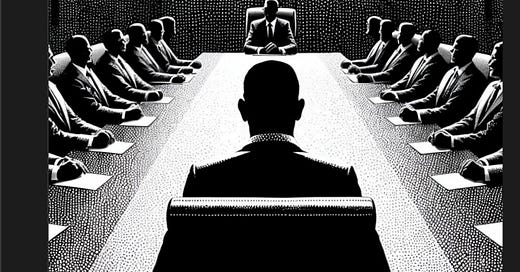


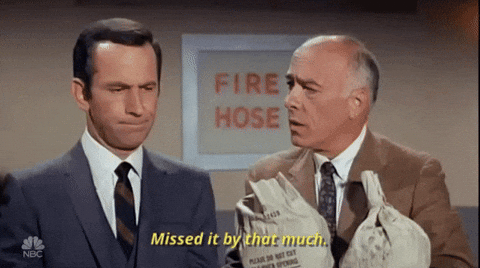
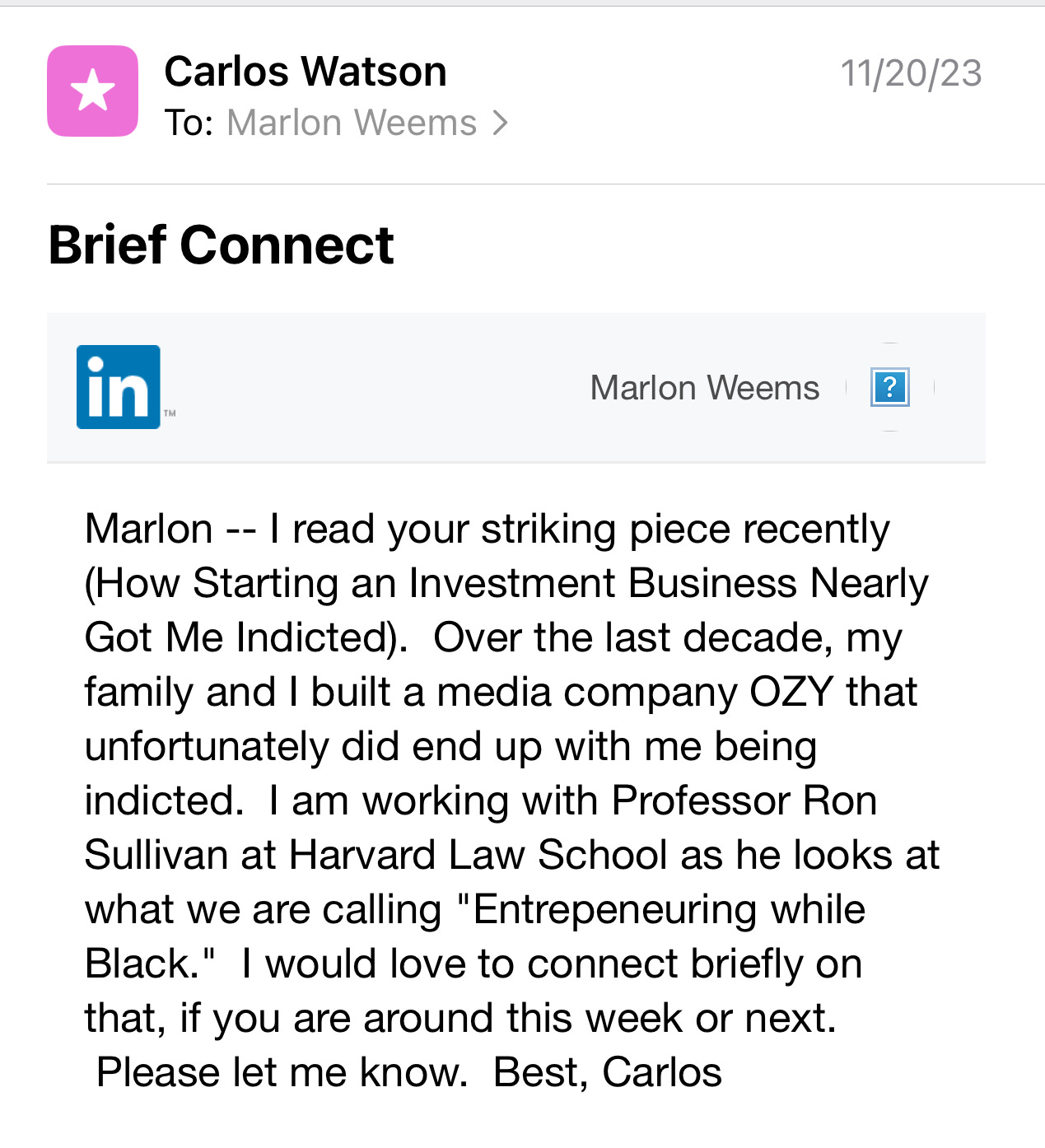
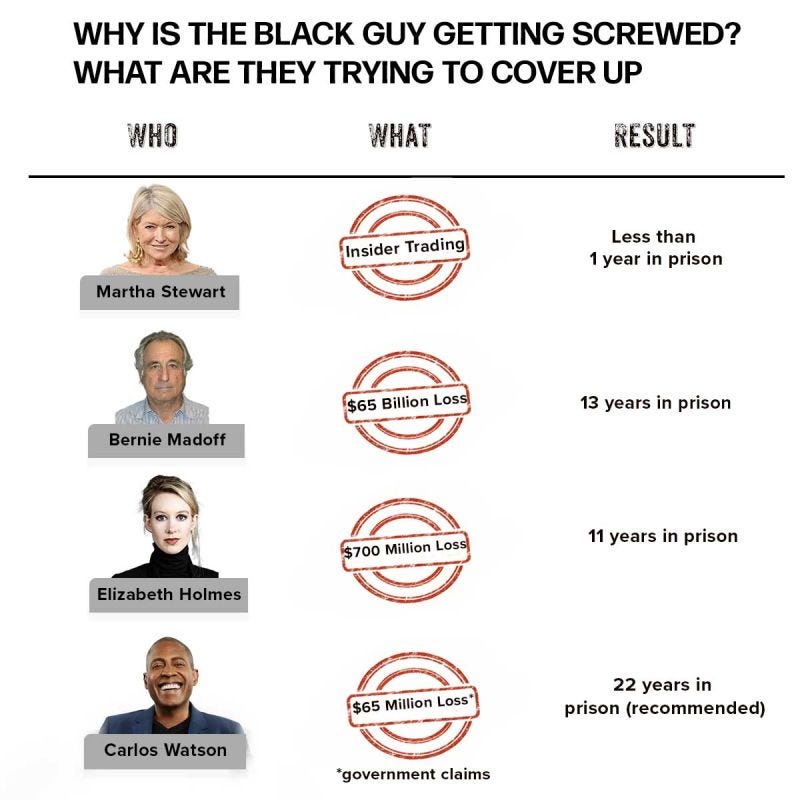
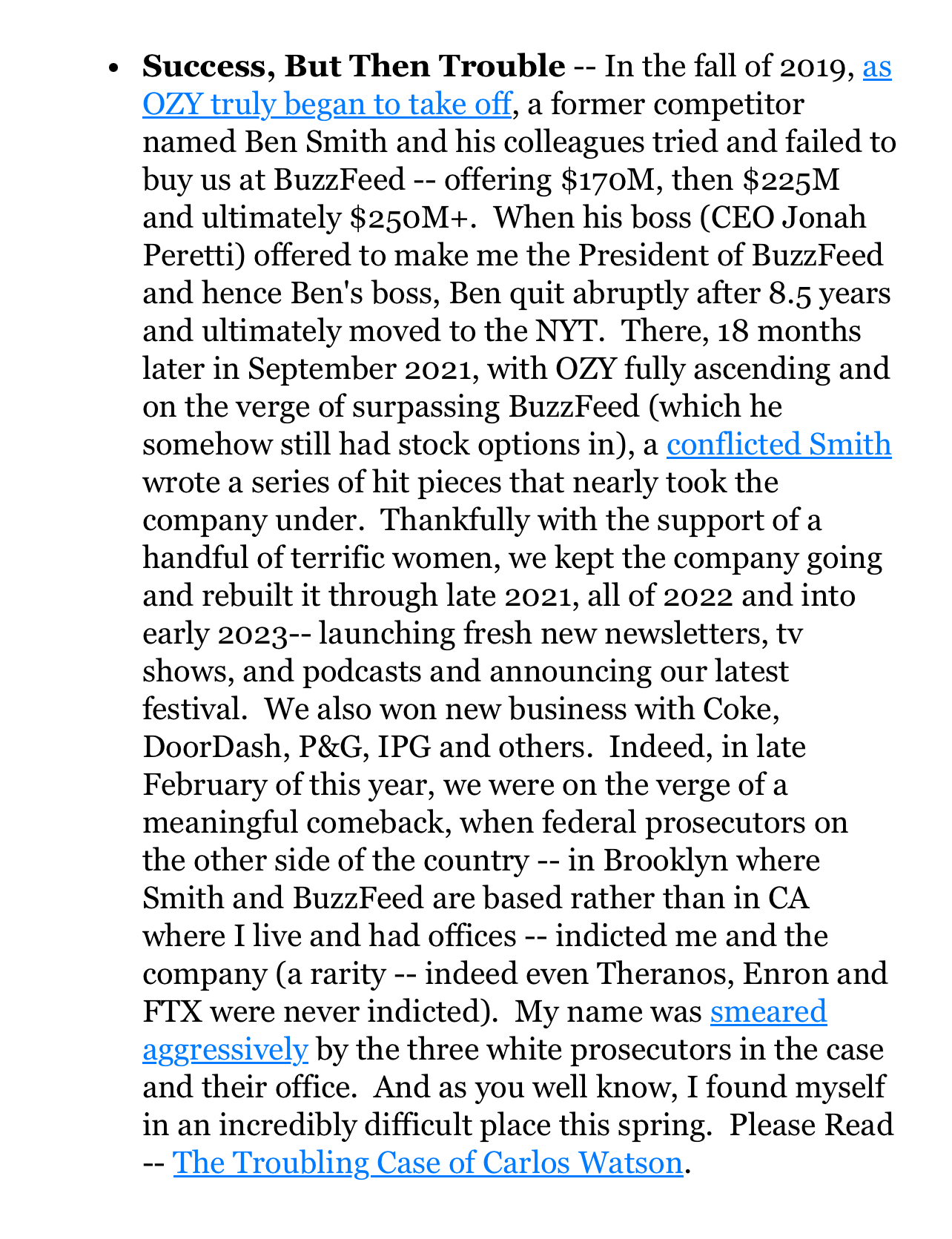


Trump pardoned him so that he could add a black person to the roster of pardons to support his argument he’s not racist. And so that a (formerly) rich black corporate guy with a megaphone can flog Trumps “compassion”. I hope Watson acts like the narcissist he is and fails to fellate Trump.
I restacked this because I have written about this case and teach it from the perspective of media’s complicity in promoting these frauds. You may be interested in what I wrote before he was convicted. I removed the paywall. https://thedig.substack.com/p/introducing-ozy-media-following-the